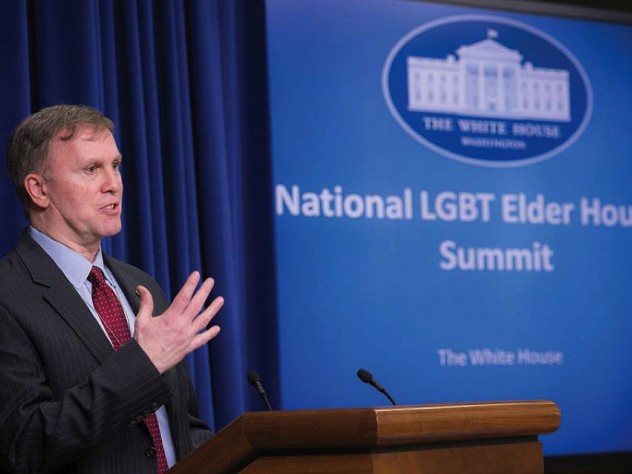Harvard and SAGE} Fears Talk About {SAGE} It's Happening to Us (Old age) Better if We Plan
A FEW YEARS after graduating from law school, Michael Adams ’83 began a decade of litigating LGBT rights cases, first at the American Civil Liberties Union and then at Lambda Legal Defense and Education Fund. But in his last few years at Lambda, he shifted away from litigation to become its director of education and public affairs. He is now CEO of SAGE—Services & Advocacy for GLBT Elders—the country's largest and oldest organization dedicated to improving the lives of lesbian, gay, bisexual, and transgender (LGBT) older adults. Even as an undergraduate, Adams was actively involved in social-justice issues, including opposition to U.S. military interventions in Central America and “pushing Harvard to adopt fair practices around sexual harassment.” Now, he says, “The issues that make my blood beat have changed over the years, but the social-justice commitment honed during my college years has remained a very powerful influence over my life.”
Adams moved to SAGE when the issue of aging was becoming much more personally relevant. His grandmother, in her nineties, was losing her health, while his partner’s elderly aunt and uncle were struggling, too. “The difference in their experiences was striking. My grandmother had six children and 14 grandkids, and was supported by so much love and support in her final years. My partner’s aunt and uncle had nobody except us, and that made it so much harder for them to have a good quality of life as they got older. It struck me that many LGBT people were aging a lot like my partner’s aunt and uncle. It wasn’t pretty and I wanted to try to do something to change that.”
Elder care has not yet become a focus in conversations about LGBT rights, Adams explains, and one consequence is that most people are unaware of the problems such elders may face. “One of the biggest challenges,” he says, “is growing old in isolation. Some of that is the result of our differing family structures—we’re much less likely than older Americans in general to be parents, and we’re much more likely to grow old single and disconnected from our families of origin. These realities mean that LGBT elders often need more services and professional care. But too often, elder-care programs don’t have the tools and knowledge to effectively support this elder population, and sometimes the very providers who are supposed to offer care engage in, or tolerate, discrimination and mistreatment instead.”
A large part of the reason LGBT elder care isn’t often discussed, he believes, is the “double whammy of ageism and the fear of growing old. In our society and our own community, we tend to value youth at the expense of old age. And at the personal level there is a lot of fear and denial about aging. Unfortunately, for a lot of people, it’s easier not to think about it. But we do ourselves and our elders a disservice when we engage in that kind of denial.”
Person-centered care, making individuals’ wants, needs, and goals for themselves central to their care, says Adams, is an “increasingly fundamental premise in the care world.” Following that principle, SAGE recognized that sexuality and gender identity, two key considerations, are often ignored when it comes to the elder community. “Historically, there’s been a presumption of heterosexuality and binary gender identities, and a presumption that elders aren’t sexual,” he explains. “Each of those presumptions is profoundly misguided.” In 2016 his efforts to help effect this “paradigm shift for the long-term-care sector” at SAGE won him the Burton Grebin Award for Innovation from the 100-member Continuing Care Leadership Coalition in New York. Anyone, he says, can be an advocate for LGBT elder care by “being a well-informed and empowered consumer if you are looking for long-term care yourself. By asking the right questions and making your choices accordingly, you force long-term-care providers to step up to the plate on person-centered care for LGBT people.”
by SANYA SAGAR
Click for more than only on SAGE but the fear of LGBT of growing old:

Comments